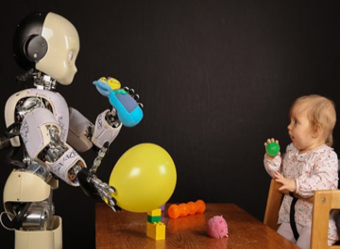To be seamlessly integrated in human populated environments, robots will be expected to have intelligent social capabilities on top of their physical abilities. Human-Centered Artificial Intelligence has a critical role in providing robots with such capabilities by addressing some of the complex computational challenges that naturalistic human-robot interactions introduce. For a robot to behave proactively and in a manner that is appropriate to the context of interaction, it should cope with uncertainty when dealing with elements that are not fully observable and often hard to predict, such as the states representing the dynamic environment and humans. To build trustworthy interactions with humans, intelligent social robots need to successfully address challenging issues such as predicting human intentions, goals, expectations, understanding and reasoning about the dynamic states of objects and other smart devices in the surroundings, and previous actions and their consequences while performing in complex situations. Trust is an important construct for evaluating adaptive social robot behaviors that could be inferred and evaluated through objective measures using computational models (e.g., the Partially Observable Markov Decision Process “POMDP”) and subjective measures by human users. Such measures can be used to assess humans’ disposition to be vulnerable around robots. Hence, addressing uncertainty is one of the key factors to develop trustworthy AI solutions and endow robots with intelligent social capabilities.
This workshop aims to gather the latest theoretical and practical research studies and expertise in intelligent social robotics at the intersection of different rapidly growing communities, including Artificial Intelligence, Machine Learning, and Human-Robot Interaction, with a focus on solutions incorporating aspects of uncertainty and trust. The intended audience includes researchers of related fields, who consider the human-interactive aspects when designing their algorithmic solutions and AI systems considering social or multi-modal aspects of the interaction. In addition, the workshop will aim to foster concrete discussions on identifying and outlining medium and long-term challenges, in each relevant community, taking us a step closer to achieving socially intelligent robots.


